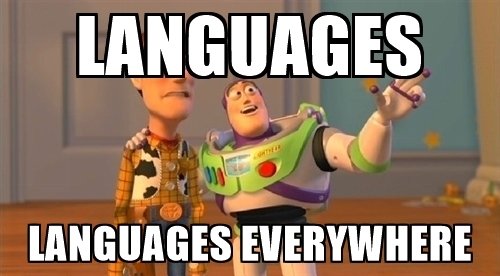Highly Practical Information Science: Specific Google Search Commands
Articles from this series
Introduction

Welcome to the sidechain of the “Information science series”. In the previous article (aside from the new series introduction) I explained how to effectively search for information through Google using logical commands. According to the number of views and feedback, you guys found the article highly valuable and I intend to continue in similar style. The strategy explained there is usable in almost every search engine and it indisputably hugely increases our searching abilities. If you after reading through the article thought that now you finally know everything about Google…oh man you couldn’t be possibly more wrong.
Languages…languages everywhere

All of us probably know that different cultures have their own languages. The same though applies to virtual space too. Ok, culture is probably not the right word to use, but you get the meaning. Different programing tools use different languages. Different Blockchains use different languages, and you probably guessed it, different search engines use different languages too.
What that means for us though? If we want to be some kind of “searching specialist”, learning just one “searching language” is simply not enough. Luckily though, most of us use mainly (if not solely) Google. The last article dealing with search engines will present another widely use commands and strategies when searching through scientific databases, whereas this one will try to inform you about the language that is understood by Google itself. Shall we start?
Search operators

Keep in mind, that the logical operators explained in previous article can be still used, even combined with the operators I’ll present now.
site:
There can be times, when you want to search for document, or specific information on certain site for multiple reasons (the source is valid, you just want to find a document that you’ve lost…etc.). I’ll use information society in every example.
information society site:steemit.com
related:
Related sources are really important when one wants to extend his knowledge about any given subject. Working with related topics is easier and more intuitive in scientific search engines, but when the need arises, one can even summon the related URLs manually in google too.
related:information society
intext:
Intext is an awesome tool that can’t be replicated by the logical command explained in the previous article, even though it has very similar purpose. When we want to search for anything and at the same time we want other term to be present in the text, or anywhere in the URL, intext: comes to rescue. The text does not necessarily have all of the keywords.
information society intext: computer OR PC
allintitle:
This command is used when we want the title to contain all the keywords we used. In other words, when we DON’T want the words to be in the text, but only in the title, we use this command.
allintitle:information society
intitle:
Modification of the previous command. When we want some words to be in the text and some words to be in the title, this command is the right one.
computer intitle: information society
allinurl:
I do not recommend this command. URL from my point of view has the tendency to be totally irrelevant when we already have keywords AND words used it the text itself. But that is just my opinion.
filetype:suffix
At first I thought that this command is not really usable (I do not present all of them and I sincerely hope that I do not miss some of the interesting ones…anyway you can always check the source). When I gave it a second try, I realized this is a really usable command. Basically when you kinda have the right keywords and you want to find a fulltext [will be explain in the main chain…sorry for the inconvenience… ”I go as the studies go” AND “I didn’t not start at the same time, so I have to catch up” (do you see what I did there? It’s funny you should laugh if you understood what I’m talking about from those two articles:D)] of any given topic, you can restrict the suffix to Pdf AND similar suffix styles.
information science filetype:pdf
Number range (crypto much?)
If you want to search for a scale in-between two set numbers this will come in handy.
Dslr $ 1.. $5 (GO GO STEEM)
Blank spot
Pay the tribute to the almighty command! This is no joke. The true king that rules them all! Do you know quite some words from any citation? Do you know quite some words but you’re still missing quite a few?
you * me one (owe was the word if you didn’t get it… I mean it:D)
Special features

A lot of you probably haven’t really thought about all of them, but at the same time most of you know at least one (rule of thumb rules! Or is it just me lol?). But they exist and they can be helpful in very occasional circumstances. You will adopt only a few I think. Keep in mind that you can use them in any language that is “known” by google translator. Anyway here they are.
- = NOT
weather: Prague
time: Prague
(sport scores but not all of them are known) Green Bay Packers AND Patriots
(calculator) 5+2
(sunrise AND sunset) sunset Prague
define information society
translate science to Czech
(flight statues) GT 598
(package tracking) 166035FGJDD616156DKFKS
IP adress (if you ever wanted to know what you public IP was)
This is it guys! There is no way you will remember all of them (I should and I won’t neither…) Save it in the favourites and check it from time to time. You search through Google every single day…LEARN HOW TO DO IT! Also feel free to check out the [source](http://coolinfographics.com/blog/2014/9/24/how-to-be-a-google-power-user.html) (this should totally work right???) even thought I only selected those that, I thought, will be usable for you…

Great contribution friend, very valuable information in this article
thanks
I need to try these on DuckDuck Go, helpful info :-)
Ive never heard about that search engine. Youll have to check which language it supports.